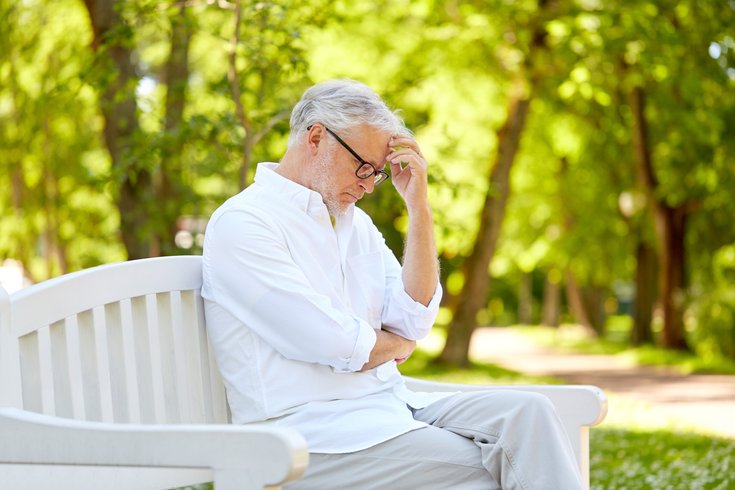
November 03, 2023
 Source/Image licensed from Ingram Image
Source/Image licensed from Ingram Image
How should men protect their own health when coping with loss or intense stress? Experts recommend talking about death, expressing one's feelings, helping others and, in time, celebrating the lives of people lost.
The recent passing of two friends within days drove home a harsh reality of the aging process – more frequent encounters with death. It's a pure numbers game, of course, that's a part of life, but one that doesn't really hit home until it hits home.
In my case, one individual was a beloved co-worker named Linda Brand. Linda was a phenomenal woman who devoted her life to Cooper University Health Care with an engaging flair and, when necessary, a forceful hand to ensure that our patients were treated with dignity and compassion. Her personality touched our lives.
The other was my friend and neighbor Frank Monzo. Frank and his wife, Mary Rita, moved next door in the early 2000s when they left Philadelphia for South Jersey. A devoted family man and great guy, Frank brought a whole new level of energy and leadership to civic affairs in our community of Haddon Township. Our town is a better place because of Frank's contributions.
The deaths of Linda and Frank – much too early – struck a chord with me, hitting harder than I would have thought. My reaction is consistent with other men. Harvard Health says that while grief is a natural emotion, men often struggle to understand how it can affect their lives.
Reflecting on my feelings, were these losses a reminder that our time here is precious? Was it the realization that I'm getting older? Could it be that significant life events, whether the passing of someone, a divorce, or a job loss, triggers a higher level of stress compared to the routine stuff to which we are accustomed? And, if this is the case, what can – and should – men do to protect our own health and well-being as we cope with intense stress?
It is important to note that the experts say that with the passage of time, social support and healthy practices, most people recover from the losses they feel. The human spirit is naturally resilient, allowing us to endure and continue with life.
The American Psychological Association explains that there is no "normal" grievance timetable and that the stages of grief are less likely to be sequential steps and more akin to a pinball bouncing from one emotion to another based on external stimulants. To support your grieving, they recommend talking about the death of your friend or loved one, accepting your feelings, helping others, and celebrating the lives of those lost over time.
Beyond our emotions, bereavement can impact our physical health and well-being. The Cleveland Clinic says that grief can exacerbate existing conditions, and spark new physical symptoms including chest pains, exhaustion, trouble sleeping, headaches, dizziness, high blood pressure and digestive problems. The Cleveland Clinic also suggests the impact can extend to a weakening of the immune system and vulnerability to contagious diseases.
Still, other authorities include weight and appetite changes among the reactions, with some indicating that it is normal to not want to eat, experience swallowing difficulties or even find that food tastes strange.
So, what can you do to counter any physical impacts you may be feeling or proactively maintain your physical well-being when you are grieving? The medical community offers several recommendations, some of which, like diet and exercise, you will recognize as healthy practices that are good for you no matter what the circumstances.
Banner Health recommends good hydration, simple and easy nutrition like fruits, nuts and whole-grain cereals several times a day, plenty of rest, and getting out for a walk or bike ride. Exercise is always good. The health system also suggests that accepting support from others can help with these logistics and provide emotional support.
Scientists at Harvard echo the recommendations from Banner, but also indicate that men managing grief can find relaxation from mind-body activities like yoga, tai chi or qigong. They cite research showing how these activities can undo the effects of stress. Hosparus Health endorses exercise, proper nutrition and sleep, and also says that a check-in with your doctor should also be considered.
According to Sue Ryder, a U.K.-based organization that provides palliative, neurological and bereavement care, surveys of men found that the same social norms and stereotypical masculine behaviors that impact a man's attitude toward healthy behavior also affects their response to bereavement. The organization found that 52% of grieving men wanted to appear strong and hide their emotions, and 35% didn't want any sympathy.
Thirty-three percent of men feared exclusion if they revealed their feelings to friends, and 46% believed that sharing their grief would make their friends feel uncomfortable. Finally, researchers found that 41% of the men indicated that they would not have been able to get through their bereavement without alcohol or drugs, and that, on average, men turned to alcohol 13 times a month and 24% used recreational drugs every day during grief.
Those are powerful findings that show how male cultural values can have lasting detrimental impacts.
No surprise, a man's reaction to loss is consistent with male behavior in other contexts that affect health and well-being. Just as traditional views on masculinity produce an aversion to an annual check-up, they impact a man's ability to grieve. Opting to pass on an annual physical is not good, and neither is hiding emotions when you are grieving.
As men, we need to confront these stereotypes, reject the definitions of masculinity that confine the willingness to reveal our emotions. There's power in grief if the process prompts men to acknowledge their feelings and initiate healthy lifestyles.
Linda and Frank opened my eyes to yet another dimension of healthy behavior in men. Its an awakening with broad implications.
Louis Bezich, senior vice president and chief administrative officer at Cooper University Health Care, is author of "Crack The Code: 10 Proven Secrets that Motivate Healthy Behavior and Inspire Fulfillment in Men Over 50." Read more from Louis on his website.